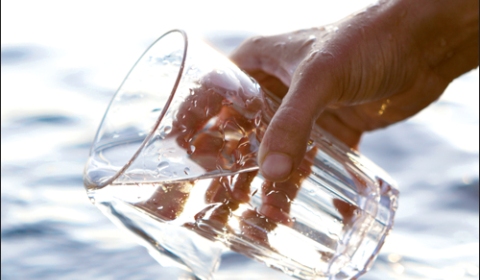Would you like a cup of seawater?

By Gulgiz Dadashova
Each resident of the planet constantly faces the problems associated with environmental changes caused by humans. The lack of clean drinking water and fresh water represents one of these issues.
The scarcity of fresh water resources and the need for additional water supply is already critical in many regions of the world and it will be increasingly important in the future. Some experts assume that the water issue may become one of the deciding factors of world stability, like fossil energy resources.
The problem is acute mainly in Arab countries, China, Israel, North Africa, Central Asia and Southern Europe. Although all of these geographic areas are in close proximity to the vast reserves of seawater, they suffer from drought during almost all four seasons of the year. The reason is simple: seawater is not suitable for drinking or irrigation. The practice of desalination - one of mankind's earliest forms of water treatment - can be a perfect remedy for this problem. Turning saline waters into fresh water may rescue the Earth given their enormously huge volumes.
Desalination is the process of reducing the volume of salt in seawater to a level of drinking water. Seawater desalination by means of reverse osmosis has been applied for more than 20 years. The process is primarily used in the parts of the world where natural ground or surface water for drinking water purposes is only present to a limited extent. Today, over 800 large desalination plants operate in the world and Kuwait is the largest producer of desalinated water.
So, desalination of the Caspian Sea water is a good idea, because, as mentioned above, the world is desperately short of drinking water.
Caspian Sea to help
Azerbaijan, which is located on the Caspian Sea, the largest water basin in the region, has decided to benefit from this unique natural resource.
A seawater desalination plant has already been launched in test mode. The desalination of water from the Caspian will provide Azerbaijan with additional opportunities for its wider use for irrigation purposes as well as drinking.
"Now, the plant is working in test mode 4-5 hours a day and no problems are recorded in its operation," Ecology and Natural Resources Minister Huseyngulu Bagirov said.
According to Bagirov, the plant, which meets all modern standards, currently purifies water for irrigation. Presently, it is planned to use some of the purified seawater for drinking. This requires clearance of the seawater from minerals and re-mineralization, Bagirov said.
"Seawater is cleaned of minerals, then minerals that are useful for the human body are added. Finally, we get high-quality water," he said.
The best solution?
Despite major advancements in desalination technologies, some experts still believe that seawater desalination remains more energy intensive compared to conventional technologies for the treatment of fresh water.
It is worthy of note that cleaning seawater at desalination plants on an industrial scale is not cheap because of the huge energy spend. The cost of building desalination plants, in itself, is rather considerable.
Some environmentalists say that while people in the Middle East and other countries have been drinking desalinated water for a long time, it has a number of shortcomings. In particular, this water tastes bad. Therefore, it is mixed with ordinary water or it passes through chalk, a natural mineralizer. The water is enriched with ions that provide the hardness and taste.
Anyway, the project on desalination of seawater has the right to exist, and the rapid pace of scientific and technological development will surely eliminate its shortcomings, because this type of water purification is one of the way-outs to address the issue of acute shortage in clean drinking water around the world.
Here we are to serve you with news right now. It does not cost much, but worth your attention.
Choose to support open, independent, quality journalism and subscribe on a monthly basis.
By subscribing to our online newspaper, you can have full digital access to all news, analysis, and much more.
You can also follow AzerNEWS on Twitter @AzerNewsAz or Facebook @AzerNewsNewspaper
Thank you!
